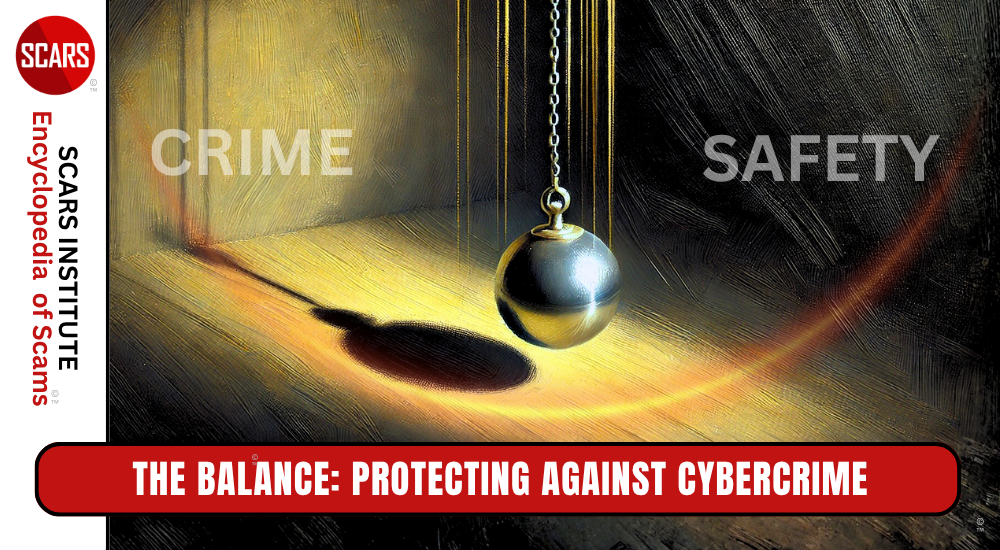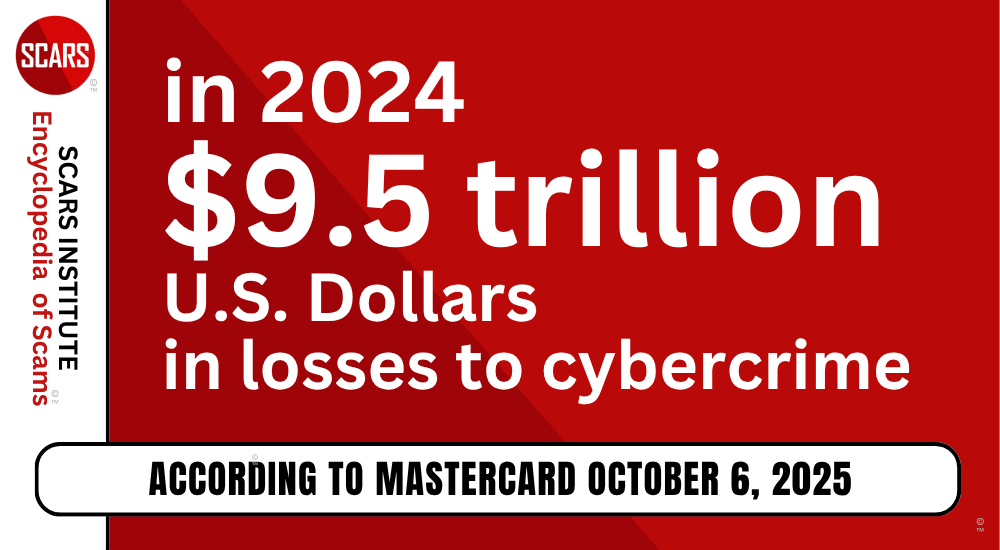
SCARS Institute’s Encyclopedia of Scams™ Published Continuously for 25 Years

The Silent Threat – The Impact of Fraud on UK National Security
By Helena Wood, Tom Keatinge, Keith Ditcham, and Ardi Janjeva
A SCARS Special Report
A U.K. Government Think Tank Research Paper
Presented by SCARS for Public Discussion
FRAUD AGAINST UK citizens, businesses and the UK public purse has reached epidemic levels – it is the ‘volume crime of our time’.
Extracted from the report (U.K. English) – republished with permission – see below for the full paper
The Silent Threat
The Impact of Fraud on UK National Security
Helena Wood, Tom Keatinge, Keith Ditcham and Ardi Janjeva
Driven in part by growing public disquiet over the current response to fraud, 2020 saw increased political attention on the issue. The prevailing political narrative, however, fails to convey the full impact of fraud on the UK, beyond the perspective of financial losses or the psychological impact on victims.
Furthermore, continued under-resourcing of the fraud response means that political rhetoric fails to match operational reality. The fraud response is seen as continuing to fail the individuals, businesses and public bodies which fall victim to it with increasing regularity.
In order to inform a new approach to tackling fraud in the UK, this paper seeks to explore the broader social, economic and criminological impacts of fraud and their particular intersection with the UK national security landscape. In doing so, it sets out the case for adopting a fundamentally different pathway for responding to the problem.
First, the paper makes the case that when viewed in the context of the UK’s National Security Objectives – particularly the objectives to ‘protect our people’ (National Security Objective 1) and ‘promote our prosperity’ (National Security Objective 3) – the limited consideration given to fraud in the national security dialogue seems increasingly perverse.
It is the crime to which UK citizens are most likely to fall victim,2 and failures in the response to date have the capacity to undermine public confidence in the rule of law. Its impact on the private sector has consequences for both the stability of individual companies and the broader reputation of the UK as a place to do business. The scale of fraud against the public purse has been described as a ‘heist on public services’3 and has the capacity to undermine public faith and trust in government.
Given the wider social and economic damage caused, the case for placing fraud in the national security context should no longer be overlooked. On this basis, this paper makes the case for a new national security approach to tackling fraud, based on a ‘whole of system’ response, including a greater role for the government intelligence architecture, a better resourced and coordinated policing response and increased coordination with the private sector. In reframing this response, understanding fraud’s interplay with more established national security threats, such as serious and organised crime (SOC) and terrorism, is also paramount. In the literature and government narrative to date, this relationship has been under-explored.
Second, therefore, this paper considers fraud as a vector of SOC. The very scale and nature of the most prevalent fraud typologies denote the involvement of organised crime groups, given either the sheer volume or the need for specialist skills to perpetrate the fraud. Despite this, there are considerable intelligence gaps surrounding fraud as an organised crime. This is particularly the case with regard to the threat emanating from overseas. This lack of understanding is found to be both a symptom and a cause of the under-representation of fraud in the SOC-specific operational response, particularly in policing – the lack of prioritisation being both symptomatic of the intelligence gaps and a cause of the limited intelligence picture needed to fill the gaps.
To remedy this, the paper recommends more focused intelligence tasking from the National Security Council, a greater emphasis on fraud within the Strategic Policing Requirement and the breaking down of informational silos to make better use of cross-organisational data-matching tools.
Third, this paper explores fraud as a terrorist financing tool and finds ample examples of the ‘repurposing’ of well-established frauds to fulfil the financing needs of a wide range of terrorist actors. In this context, frauds against individuals – including courier fraud, online sales-based fraud and identity fraud – and the private sector echo many of the typologies seen in the organised crime sphere. On this basis, the paper makes the case for mandatory fraud investigation training for counterterrorism investigators as a key alternative disruption tool.
The role of fraud against the public sector is also explored, including benefit, tax credit and student loan fraud, and the key role these variants play in ‘supporting the terrorist rather than the terrorist act’.4 In assessing this, the paper makes the case for continuing the secondments of tax and benefits staff to the National Terrorist Financial Investigation Unit.
The wider social and economic impacts of fraud make a clear case for reframing the UK’s fraud problem as a national security priority, for adopting a more centrally led, ‘whole of system’ response and for considerably augmenting the resources within the policing and intelligence community specifically assigned to tackling fraud. Furthermore, to ensure a better understanding of both the fraud threat and the way in which fraud acts as an enabler and vector of other threats, the rebuilding and reframing of the fraud response should not be carried out in isolation, but should build in organisational and informational links to the SOC- and terrorism-specific responses.
In summary, we should no longer be making the case for fraud as a national security concern – we should question the risk of not doing so.
SCARS Note:
We view this as a significant change in the mentality of government on large-scale financial fraud and scams. This represents both a critical analysis and a pragmatic set of recommendations. While we feel this falls short of the solution that is truly required, we do feel that it is a framework that can be adopted and allow for further development. Our concern is that there was such a group created in the United States that was developing such strategies, but that the Biden administration has canceled it. We see no emphasis in the current administration on these issues, yet its impact on the U.S. economy and public is just as great (if not greater).
[pdf-embedder url=”https://romancescamsnow.com/wp-content/uploads/2021/04/the_silent_threat_web_version.pdf”]
TAGS: SCARS, Scams, Scammers, Fraudsters, Cybercrime, Crybercriminals, Financial Fraud, Online Crime Is Real Crime, Scam Avoidance, The Silent Threat, U.S. Research Paper, Royal United Services Institute, RUSI,
PLEASE SHARE OUR ARTICLES WITH YOUR FRIENDS & FAMILY
HELP OTHERS STAY SAFE ONLINE – YOUR KNOWLEDGE CAN MAKE THE DIFFERENCE!
THE NEXT VICTIM MIGHT BE YOUR OWN FAMILY MEMBER OR BEST FRIEND!
By the SCARS™ Editorial Team
Society of Citizens Against Relationship Scams Inc.
A Worldwide Crime Victims Assistance & Crime Prevention Nonprofit Organization Headquartered In Miami Florida USA & Monterrey NL Mexico, with Partners In More Than 60 Countries
To Learn More, Volunteer, or Donate Visit: www.AgainstScams.org
Contact Us: Contact@AgainstScams.org
-/ 30 /-
What do you think about this?
Please share your thoughts in a comment below!
Table of Contents
- A SCARS Special Report
- A U.K. Government Think Tank Research Paper
Presented by SCARS for Public Discussion - The Silent Threat
- PLEASE SHARE OUR ARTICLES WITH YOUR FRIENDS & FAMILY
- By the SCARS™ Editorial Team
Society of Citizens Against Relationship Scams Inc. - The Issue Of Race In Scam Reporting
Click Here To Learn More!
LEAVE A COMMENT?
Recent Comments
On Other Articles
- Arwyn Lautenschlager on Love Bombing And How Romance Scam Victims Are Forced To Feel: “I was love bombed to the point that I would do just about anything for the scammer(s). I was told…” Feb 11, 14:24
- on Dani Daniels (Kira Lee Orsag): Another Scammer’s Favorite: “You provide a valuable service! I wish more people knew about it!” Feb 10, 15:05
- on Danielle Delaunay/Danielle Genevieve – Stolen Identity/Stolen Photos – Impersonation Victim UPDATED 2024: “We highly recommend that you simply turn away form the scam and scammers, and focus on the development of a…” Feb 4, 19:47
- on The Art Of Deception: The Fundamental Principals Of Successful Deceptions – 2024: “I experienced many of the deceptive tactics that romance scammers use. I was told various stories of hardship and why…” Feb 4, 15:27
- on Danielle Delaunay/Danielle Genevieve – Stolen Identity/Stolen Photos – Impersonation Victim UPDATED 2024: “Yes, I’m in that exact situation also. “Danielle” has seriously scammed me for 3 years now. “She” (he) doesn’t know…” Feb 4, 14:58
- on An Essay on Justice and Money Recovery – 2026: “you are so right I accidentally clicked on online justice I signed an agreement for 12k upfront but cd only…” Feb 3, 08:16
- on The SCARS Institute Top 50 Celebrity Impersonation Scams – 2025: “Quora has had visits from scammers pretending to be Keanu Reeves and Paul McCartney in 2025 and 2026.” Jan 27, 17:45
- on Scam Victims Should Limit Their Exposure To Scam News & Scammer Photos: “I used to look at scammers photos all the time; however, I don’t feel the need to do it anymore.…” Jan 26, 23:19
- on After A Scam, No One Can Tell You How You Will React: “This article was very informative, my scams happened 5 years ago; however, l do remember several of those emotions and/or…” Jan 23, 17:17
- on Situational Awareness and How Trauma Makes Scam Victims Less Safe – 2024: “I need to be more observant and I am practicing situational awareness. I’m saving this article to remind me of…” Jan 21, 22:55
ARTICLE META
Important Information for New Scam Victims
- Please visit www.ScamVictimsSupport.org – a SCARS Website for New Scam Victims & Sextortion Victims
- Enroll in FREE SCARS Scam Survivor’s School now at www.SCARSeducation.org
- Please visit www.ScamPsychology.org – to more fully understand the psychological concepts involved in scams and scam victim recovery
If you are looking for local trauma counselors please visit counseling.AgainstScams.org or join SCARS for our counseling/therapy benefit: membership.AgainstScams.org
If you need to speak with someone now, you can dial 988 or find phone numbers for crisis hotlines all around the world here: www.opencounseling.com/suicide-hotlines
A Note About Labeling!
We often use the term ‘scam victim’ in our articles, but this is a convenience to help those searching for information in search engines like Google. It is just a convenience and has no deeper meaning. If you have come through such an experience, YOU are a Survivor! It was not your fault. You are not alone! Axios!
A Question of Trust
At the SCARS Institute, we invite you to do your own research on the topics we speak about and publish, Our team investigates the subject being discussed, especially when it comes to understanding the scam victims-survivors experience. You can do Google searches but in many cases, you will have to wade through scientific papers and studies. However, remember that biases and perspectives matter and influence the outcome. Regardless, we encourage you to explore these topics as thoroughly as you can for your own awareness.
Statement About Victim Blaming
SCARS Institute articles examine different aspects of the scam victim experience, as well as those who may have been secondary victims. This work focuses on understanding victimization through the science of victimology, including common psychological and behavioral responses. The purpose is to help victims and survivors understand why these crimes occurred, reduce shame and self-blame, strengthen recovery programs and victim opportunities, and lower the risk of future victimization.
At times, these discussions may sound uncomfortable, overwhelming, or may be mistaken for blame. They are not. Scam victims are never blamed. Our goal is to explain the mechanisms of deception and the human responses that scammers exploit, and the processes that occur after the scam ends, so victims can better understand what happened to them and why it felt convincing at the time, and what the path looks like going forward.
Articles that address the psychology, neurology, physiology, and other characteristics of scams and the victim experience recognize that all people share cognitive and emotional traits that can be manipulated under the right conditions. These characteristics are not flaws. They are normal human functions that criminals deliberately exploit. Victims typically have little awareness of these mechanisms while a scam is unfolding and a very limited ability to control them. Awareness often comes only after the harm has occurred.
By explaining these processes, these articles help victims make sense of their experiences, understand common post-scam reactions, and identify ways to protect themselves moving forward. This knowledge supports recovery by replacing confusion and self-blame with clarity, context, and self-compassion.
Additional educational material on these topics is available at ScamPsychology.org – ScamsNOW.com and other SCARS Institute websites.
Psychology Disclaimer:
All articles about psychology and the human brain on this website are for information & education only
The information provided in this article is intended for educational and self-help purposes only and should not be construed as a substitute for professional therapy or counseling.
While any self-help techniques outlined herein may be beneficial for scam victims seeking to recover from their experience and move towards recovery, it is important to consult with a qualified mental health professional before initiating any course of action. Each individual’s experience and needs are unique, and what works for one person may not be suitable for another.
Additionally, any approach may not be appropriate for individuals with certain pre-existing mental health conditions or trauma histories. It is advisable to seek guidance from a licensed therapist or counselor who can provide personalized support, guidance, and treatment tailored to your specific needs.
If you are experiencing significant distress or emotional difficulties related to a scam or other traumatic event, please consult your doctor or mental health provider for appropriate care and support.
Also read our SCARS Institute Statement about Professional Care for Scam Victims – click here to go to our ScamsNOW.com website.


















Thank you for your comment. You may receive an email to follow up. We never share your data with marketers.